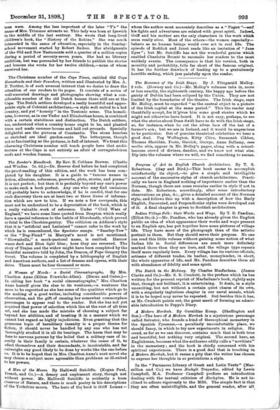Dictionary of National Biography. Vol. LVII. Edited by Sidney Lee.
(Smith, Elder, and Co. 15s. net.)—Among the most interest- ing names in the fifty-seventh volume of the Dictionary of Nationat Biography are Anthony Trollope, the novelist, and Turner, the painter. The life of the latter by Cosmo Monkhouse is a curious study. The son of a London barber, the poetry and romance of Turner's pictures seem to find no echo in his character. His' friendship for his father is perhaps the most romantic thing ir his life, but even that had its sordid side. They were one as penurious as the other. "Dad never praised me for anything but saving a halfpenny," he said, while "his father, always his willing servant," spent his latter years "opening his gallery in Queen Anne Street, stretching his canvases, working in his garden, and doing what he could to save his son's money." In early life Turner and his friend Girtin used to walk from London to Bushey and back to make drawings for Dr. Munro at half-a- crown apiece and a supper. If, however, his love of money was one of his greatest passions, and his "honesty sometimes hard to defend," his pictures are not his only good deeds. He washed the " Cologne " over with lampblack because its brilliant colour killed two portraits by Sir Thomas Lawrence hanging on either side of it, and excused his act of kindness by saying "Lawrence was so unhappy." He several times refused money offered for his pictures in order to preserve them for the public on the score that he had already willed them to the nation. He left £140,000, much of which was wasted in lawsuits after his death. Mr. Richard Garnett's criticism on Anthony Trollope seems to 113 excellent :—" If to represent reality is to be a realist, Trollops, was one of the greatest realists that ever wrote." "His works may fall into temporary oblivion, but when the twentieth century desires to estimate the nineteenth, they will be disinterred and studied with an attention accorded to no other contemporary work of the kind, except perhaps, George Eliot's 'Middlemarch." The public is indebted to Trollope for the invention of pillar posts as well as for the creation of Dean Grandy. Tyndale, the reformer, and Tyndall, the man of science, both have several pages allotted to them. Tyndale's translation of part of the Bible greatly modified the Authorised Version, and his style and method were adopted by the translators throughout. Oddly enough, the modern sub- stitution of " love " for " charity " is a reversion to Tyndale': rendering. The life of "Horne Tooke, politician and philologist, and we may add, sceptic and parson, is satisfactory reading. !t makes us feel that public men and manners have improved In the last hundred years, and we can feel thankful we arenot as other
enen were. Among the less important of the later "T's " the named Mrs. Trimmer attracts us. This lady was born at Ipswich in the middle of the last century. She wrote that long-lived children's book, the "History of the Robins." She was much Interested in the cause of education, especially in the Sunday- school movement started by Robert Raikes. Her abridgments of the Old and New Testaments sold a quarter of a million copies during a period of seventy-seven years. She had no literary ambition, but was persuaded by her friends to publish the stories and lessons she wrote for her twelve children,—none of whom survived her.



































 Previous page
Previous page